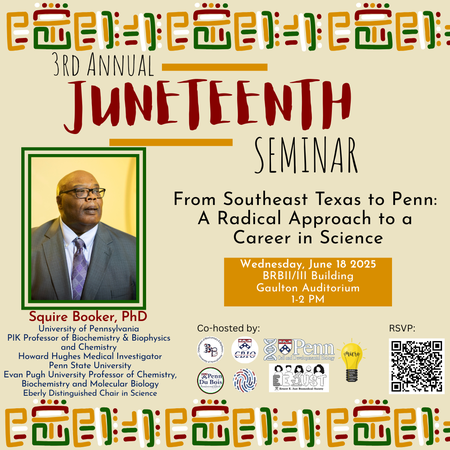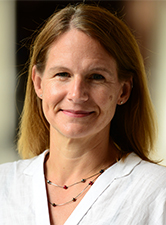Welcome to the Department of Biochemistry and Biophysics
Spotlight
Juneteenth Seminar with Dr. Squire Booker

We are thrilled to share that this year's Juneteenth Seminar will feature B&B's own Dr. Squire Booker! His talk, "From Southeast Texas to Penn: A Radical Approach to a Career in Science," will take place on Wednesday, June 18th at 1:00pm in the Gaulton Auditorium, BRB. Register using the QR code in the flyer.

Chair

Vice Chair
As one of the first departments of Biochemistry and Biophysics in the nation, we are proud of our strong tradition of combining cutting-edge technology with impactful biology. We continue to leverage this interdisciplinary approach to yield break-through discoveries in biomedicine.
Our faculty of over 30 primary and secondary members cover a broad range of research areas, with particular strengths in structural biology, chemical biology, gene regulation and protein folding.
We are also the proud home of the Eldridge Reeves Johnson Research Foundation which offers advanced physical instrumentation and instruction to researchers across campus. We are actively growing, with several recent hires, and our faculty are broadly engaged across campus with many joint appointments in other departments, institutes and centers.
We welcome you to learn more about our department in the following pages or contact us.
News & Publications
-
Sgourakis Lab in Proc Natl Acad Sci U S A
Monday, June 9, 2025
New paper from the Sgourakis Lab, "Solution mapping of MHC-I:TCR interactions using a minimalistic protein system"
-
Van Duyne/Gupta and Black Labs in Chromosome Res
Thursday, June 12, 2025
New collaborative paper from the Van Duyne/Gupta and Black Labs, "Solution conformational differences between conventional and CENP-A nucleosomes are accentuated by reversible deformation under high pressure"
-
Vinogradov Lab in J Phys Chem B
Friday, June 13, 2025
New paper from the Vinogradov Lab, "Exciton Coupling and Charge Transfer Dynamics in Zn(II) Complexes of π-Extended Dipyrrins"
Seminars & Events
-
Raiziss Rounds Seminars
Thursday, January 9, 2025
Thursday, May 15, 2025
Our Spring 2025 Raiziss Rounds Seminar Series will begin on January 9th and will continue on Thursdays at 12:00 noon until May 15th. The full seminar schedule can be found on our Raiziss Rounds page.
-
Friday Research Discussions
Friday, January 17, 2025
Friday, May 16, 2025
4:00pm
Friday Research Discussions occur every Friday at 4:00pm in the JF Library. View the full schedule for the semester here.

